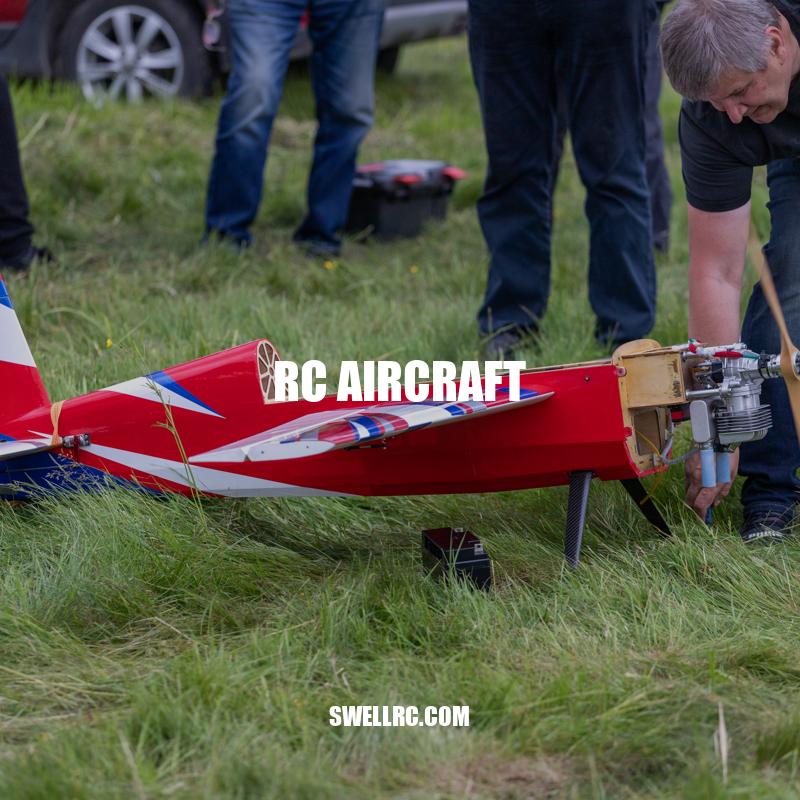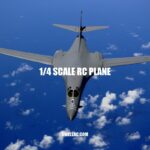Exploring the World of RC Aircraft: Types, Mechanics, and Future Trends
RC aircraft, short for radio-controlled aircraft, has been a popular hobby among aviation enthusiasts for decades. This type of model aircraft consists of remote-controlled planes, helicopters, drones, and gliders, which allow the pilot to control their aircraft in real-time. The introduction of modern technologies has made it possible to engage in this hobby more easily than ever before. The use of electric motors and rechargeable batteries has largely replaced gas-powered engines. In this article, we’ll delve into different types of RC aircraft, how they work, and what makes them so enjoyable. We’ll also offer some practical tips for beginners to increase their skills and expertise in the field. Finally, we’ll look at the future of the RC aircraft hobby and what exciting developments we can expect in the coming years. Whether you’re new to RC aircraft or a seasoned pilot, we hope this article will provide you with a better understanding of this amazing hobby and inspire you to take to the skies.
RC aircraft come in different shapes, sizes, and types, each with its specific features and capabilities. Here are some of the most popular varieties of RC aircraft:
- Planes: RC planes mimic the design of actual planes and come in various shapes and sizes.
- Helicopters: RC helicopters are often highly maneuverable and designed for stunts and tricks.
- Drones: These are becoming more popular and often come with added features, such as GPS location tracking or aerial photography capabilities.
- Gliders: These aircraft don’t have an engine and use air currents to sustain themselves in the air.
Each of these types has its benefits and drawbacks, and you should choose the one that best suits your skill level, interest, and purpose.
If you want to buy an RC aircraft, there are many options available online that will cater to every need, budget, and expertise level. Websites such as HobbyKing, Tower Hobbies, and Amazon offer a broad range of RC aircraft, parts, and accessories. Make sure to do your research and read reviews before making a purchase to ensure that you buy the right product for your skill level and interests.
What are the 4 types of aircraft?
The four types of aircraft are propeller aircraft, jet aircraft, rotorcraft, and other types of powered aircraft. Propeller aircraft, also known as piston-powered aircraft, use a propeller to generate thrust. Jet aircraft, on the other hand, use jet engines that produce high-speed exhaust gases to propel the plane forward. Rotorcraft, such as helicopters, use rotating blades to generate lift and propulsion. Other types of powered aircraft include gliders, balloons, and airships.
RC aircraft work by utilizing the principles of aerodynamics to generate lift and control the movement of air over the wings and control surfaces of the aircraft. Here are the key components of an RC aircraft:
– Transmitter: Sends signals to the receiver on the aircraft
– Receiver: Receives signals from the transmitter and controls the aircraft’s movements
– Electric Motor or Engine: Provides power to the propeller or rotor blades
– Control Surfaces: Includes the ailerons, elevator and rudder that control the movement of the aircraft
RC aircraft can run on different types of power, including electricity, gasoline or nitro fuel. The choice of power depends on the type of aircraft and the intended use.
Electric RC aircraft are popular because they are more affordable, easier to maintain and better for the environment. It is also possible to upgrade the electric motor and battery to increase power and speed. Gasoline and nitro fuel RC aircraft are more powerful and allow for longer flight times but are generally more expensive to purchase, operate, and maintain.
There are also some interesting facts to note about RC aircraft:
– The first radio-controlled model aircraft flew in England around the time of World War II.
– Some RC aircraft can reach speeds of over 200 mph.
– RC gliders have set altitude records exceeding 40,000 feet!
If you’re interested in learning more about RC aircraft, check out Horizon Hobby, a website offering a wide range of RC aircraft and related gear.
How does an RC airplane work?
An RC airplane works by being controlled through radio signals transmitted by a hand-held transmitter and received by an electronic receiver inside the airplane. The receiver then moves mechanisms that change the position of the plane such as the rudder, elevator and ailerons, allowing it to fly. For more information, check out the webpage on Radio control at Wikipedia.
Tips for Flying RC Aircraft
Flying RC aircraft can be challenging, especially for beginners. Here are some tips that can help improve your flying skills:
- Start with a simple model: It’s important to start with a simple and easy-to-fly model if you are a beginner. This will help you learn the basics of flying and give you the confidence you need to move on to more advanced models.
- Practice in an open space: Choose a large, open space with no obstacles or people around. This way, you will be less likely to crash your aircraft and damage it or cause harm to others.
- Fly with a friend: Flying with a friend who has more experience than you can be helpful. They can provide guidance and tips and can even take control of the aircraft if needed.
- Keep the aircraft in sight: Always keep the aircraft within your line of sight. This will help you maintain control and avoid crashing into obstacles or losing the aircraft.
- Check and maintain your aircraft: Regularly check and maintain your aircraft to ensure it’s in good condition. For example, make sure the battery is fully charged, the control surfaces are properly adjusted, and the aircraft is free from any damage or defects.
- Fly Responsibly: Follow all the safety guidelines and regulations for flying RC aircraft to ensure the safety of others and property.
There are many resources available on the internet that can help you improve your flying skills and learn more about RC aircraft. Websites such as RCGroups.com, RC Universe, and FlyingGiants.com offer reviews, forums, and tips for RC aircraft enthusiasts. Additionally, there are many RC aircraft manufacturers that offer beginner-friendly aircraft and accessories to help you get started.
Is it hard to fly an RC plane?
Learning how to fly an RC plane is not as hard as it may seem. However, it does require some practice and patience. Many people make the mistake of buying an expensive RC plane without first learning the basics of flying. It is recommended to start with a beginner-level plane and practice in an open area free of obstacles. There are many online resources available such as YouTube tutorials and RC flying clubs that offer training and support for new fliers. Additionally, some RC plane brands like Horizon Hobby offer beginner-friendly planes with built-in stabilization technology that makes flying easier. Overall, with the right approach, flying an RC plane can be a fun and rewarding hobby.
The Future of RC Aircraft
The future of RC aircraft looks bright, with many exciting developments on the horizon. Here are some emerging trends and advancements to look out for:
- Use of artificial intelligence: Some manufacturers are developing RC aircraft that use artificial intelligence to make flying easier and more intuitive. For example, an aircraft can be programmed to use machine learning to avoid obstacles and adjust flight patterns based on environmental factors.
- Virtual reality integration: Incorporating virtual reality into RC aircraft can give pilots a more immersive and realistic flying experience. This can be achieved through the use of headsets, goggles, and other VR devices.
- Improved battery life: Advances in battery technology mean that RC aircraft can now run for longer periods on a single charge. This is particularly useful for drones and other models that require long flight times.
- More sophisticated controls: Manufacturers are continually improving the controls on RC aircraft to make them more intuitive and user-friendly. For example, some models now come with advanced features such as touchscreen controls and voice commands.
- Expanding market: The popularity of RC aircraft is growing, which is leading to an expanding market for manufacturers. This means that there will be more variety and options available for consumers, including models at lower price points.
To stay up-to-date with the latest advancements and trends in the world of RC aircraft, there are many online resources available. Websites such as RotorDrone Magazine, RC Helicopter Fun, and RC World are great sources for news and reviews of RC aircraft. Additionally, many manufacturers have their own blogs and forums where enthusiasts can share tips, discuss new products and developments, and connect with other RC aircraft enthusiasts.
How will airplanes change in the future?
Airplanes are expected to become faster, more efficient and fly longer distances in the future. New technological advancements will also make air travel safer. The future of air travel looks exciting with these advancements.
Conclusion
In conclusion, RC aircraft is a fun and engaging hobby that has gained significant popularity worldwide. From planes to helicopters to drones, there are many different types of models to choose from, each with its unique features and advantages. By understanding the science behind flight, taking proper safety precautions, and practicing regularly, anyone can learn to fly an RC aircraft and experience the thrill of piloting their own plane or helicopter.
Furthermore, with the advancements in technology and emerging trends, the future looks set to be even more exciting for the world of RC aircraft. From the use of artificial intelligence to virtual reality integration and improved battery life, there are many new developments on the horizon that will make flying an RC aircraft even more enjoyable and accessible. As the hobby continues to grow and evolve, we can expect to see even more exciting advancements in the years to come.
In conclusion, RC aircraft is not just a hobby but a passion for those who love aviation and technology. The increasing number of enthusiasts has led to many developments and innovations in this field. While many may view RC aircraft as more than just a child’s play, the hobby is challenging and is a great way to enhance cognitive and creative skills. So whether you are an experienced pilot or just a beginner, it’s never too late to start your journey in the exciting world of RC aircraft.



